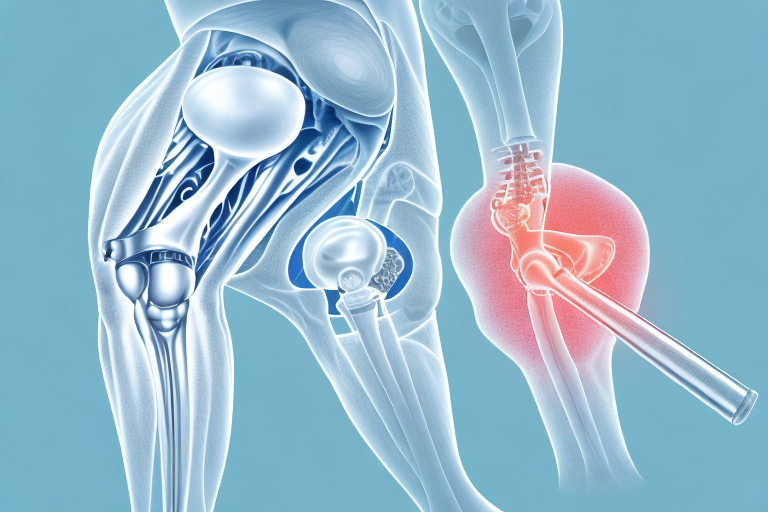What is Knee Replacement Surgery?
Knee replacement surgery, also known as knee arthroplasty, involves removing damaged parts of the knee joint and replacing them with artificial components. The primary goal is to alleviate pain and restore function in a severely diseased or damaged knee joint.
The knee joint comprises three main parts: the femur (thigh bone), tibia (shin bone), and patella (kneecap). During the procedure:
The damaged ends of the femur and tibia are removed and reshaped to fit the prosthetic components.
These components, typically made of metal and plastic, are then fixed to the bones, creating a new joint surface.
In some cases, the underside of the patella is also resurfaced and fitted with a plastic prosthetic.
There are different types of knee replacement surgeries, including total knee replacement, partial knee replacement, and kneecap replacement.
The choice of procedure depends on the extent of damage and the specific needs of the patient.
The artificial components used in knee replacement are designed to mimic the natural movement of the knee, allowing patients to return to most of their regular activities with reduced pain and improved joint function.
Reasons for Knee Replacement Surgery
Knee replacement surgery is typically recommended when the knee joint is damaged to the extent that it causes chronic pain and hinders daily activities. Several conditions and injuries, such as knee osteoarthritis can lead to this level of damage.
Osteoarthritis
Osteoarthritis, a degenerative joint disease, is the most common reason for knee replacement. It occurs when the protective cartilage that cushions the ends of the bones wears down over time, leading to pain, swelling, and reduced joint mobility.
Rheumatoid Arthritis
Rheumatoid arthritis is an autoimmune condition where the immune system attacks the synovium – the lining of the membranes that surround the knee joint. This results in inflammation and thickening of the synovium, which can destroy the cartilage and bone within the joint.
Post-traumatic Arthritis
Post-traumatic arthritis develops after a knee injury, such as a fracture, ligament tear, or meniscus tear. The injury can accelerate the breakdown of joint cartilage, leading to pain and stiffness similar to osteoarthritis.
Severe Knee Injury
Injuries to the knee, such as fractures, torn ligaments, or meniscus tears, can damage the joint. If not treated properly or if they recur, these injuries can cause instability and additional wear on the joint cartilage, necessitating a knee replacement.
Other Conditions Leading to Significant Joint Damage
There are other less common conditions that can cause significant knee joint damage. These include avascular necrosis (loss of bone caused by insufficient blood supply), bone dysplasias (abnormal bone growth), and certain infections. In these cases, knee replacement might be considered if the damage is extensive and other treatments are ineffective.
Types of Knee Replacement Surgeries
Depending on the extent of damage and the specific needs of the patient, different types of knee replacement surgeries are available.
Total Knee Replacement
In a total knee replacement, the entire knee joint is replaced. This involves removing the damaged bone and cartilage from the femur, tibia, and often the patella. These are then replaced with artificial components made of metal and plastic to recreate the joint surface.
Partial Knee Replacement
Also known as unicompartmental knee replacement, partial knee replacement involves replacing only the damaged part of the knee. This procedure is suitable for patients whose damage is limited to one compartment of the knee, allowing the surgeon to preserve as much of the original joint as possible.
Kneecap Replacement
Kneecap replacement, or patellofemoral arthroplasty, focuses on replacing the joint surface of the kneecap and the groove at the end of the thigh bone. This procedure is an option for patients with arthritis that primarily affects the kneecap.
Complex (or Revision) Knee Replacement
Complex knee replacement is typically performed on patients who have severe bone loss due to arthritis, deformities, or a previous knee replacement surgery that failed. This procedure might require larger implants or bone grafts to rebuild the joint.
Procedure Details
Pre-surgery Preparations:
- Physical Exams: A thorough examination is conducted to assess the patient’s overall health and ensure they are fit for surgery. This includes checking vital signs, cardiovascular health, and any potential risks that might affect the surgery.
- Blood Tests: These are essential to determine factors like blood type, white blood cell count, and clotting function. They help in identifying any underlying conditions that might interfere with the surgery or the healing process.
- Imaging Tests: A series of imaging tests, such as X-rays, MRI, or CT scans, are performed on the knee. These images provide a detailed view of the knee’s structure, revealing the extent of damage and helping the surgeon plan the procedure.
The Surgical Process:
- Anaesthesia: Before the surgery begins, anesthesia is administered. There are two main types: general anaesthesia, where the patient is unconscious throughout the procedure, and regional anaesthesia, which numbs only a specific part of the body. The choice depends on the patient’s health, the surgeon’s recommendation, and the patient’s preference.
- Incision: A surgical cut is made over the knee to access the joint. The size and position of the incision can vary based on the specific technique being used.
- Removal of Damaged Parts: The damaged bone and cartilage surfaces are then removed from the femur (thigh bone), tibia (shin bone), and patella (kneecap).
- Insertion of the Prosthetic Joint: Once the damaged parts are removed, the surgeon places the prosthetic joint. This artificial joint is designed to replicate the knee’s natural movement and function. It’s typically made of metal and plastic components that fit together to allow smooth movement.
Post-surgery:
- Recovery Room Monitoring: After the surgery, the patient is moved to a recovery room. Here, medical staff monitor vital signs, pain levels, and any immediate reactions to the surgery.
- Hospital Stay Duration: The length of the hospital stay can vary. Some patients might be discharged on the same day, while others might need to stay overnight or longer. The duration depends on the patient’s health, the complexity of the surgery, and the speed of initial recovery.
Benefits Of Knee Replacement Surgery
Knee replacement surgery, while a significant medical procedure, offers several notable benefits that can greatly improve the patient’s quality of life. These benefits are primarily centred around pain management, mobility enhancement, and overall life quality improvement.
Pain Relief
- Immediate Alleviation: One of the primary reasons individuals opt for knee replacement surgery is the persistent and often debilitating pain associated with joint damage. Post-surgery, many patients report a significant reduction in pain levels.
- Long-term Relief: Unlike some treatments that offer only temporary relief, knee replacement surgery aims to provide long-term pain alleviation. With the damaged parts of the knee replaced by prosthetics, the source of the pain is effectively addressed.
Improved Mobility
- Restored Movement: Damaged knees can severely restrict movement, making even simple tasks challenging. After surgery, patients often find they can move more freely, without the hindrance of pain or stiffness.
- Increased Range: The surgery not only alleviates pain but can also increase the knee’s range of motion. This means activities that were previously difficult or impossible, such as climbing stairs or walking long distances, become achievable again.
Enhanced Quality of Life
- Independence: With reduced pain and improved mobility, many patients find they can return to activities they love, whether it’s gardening, sports, or simply going for a walk. This regained independence can significantly boost morale and overall well-being.
- Mental Well-being: Chronic pain can have a profound impact on mental health, leading to conditions like depression or anxiety. By addressing the root cause of the pain, knee replacement surgery can also have positive effects on a patient’s mental and emotional state.
- Social and Recreational Activities: Being mobile and pain-free allows patients to re-engage in social activities, hobbies, and recreational pursuits, further enhancing their quality of life.
Recovery and Rehabilitation
Recovery and rehabilitation are crucial phases following knee replacement surgery. These stages ensure the success of the procedure and the patient’s return to optimal function. The process involves a combination of medical care, physical therapy, and home-based practices.
Immediate Post-surgery Care
- Physical Therapy: Soon after the surgery, patients begin physical therapy. This therapy is essential to restore joint movement, strengthen the surrounding muscles, and promote proper function of the replaced knee. Initially, simple movements are introduced, gradually progressing to more complex exercises as the patient’s strength and mobility improve.
- Pain Management: Managing pain is a priority in the immediate aftermath of the surgery. Medical professionals administer pain-relieving medications to ensure the patient’s comfort. The type and duration of medication depend on the patient’s pain levels and overall health.
Home Care
- Exercises: Once discharged, patients are provided with a set of exercises to perform at home. These exercises, often an extension of the physical therapy received in the hospital, are crucial for continued improvement in knee function and strength.
- Precautions: Patients are advised to take certain precautions to prevent complications. These include avoiding specific movements that might strain the new joint, using assistive devices like walkers or crutches, and ensuring the surgical site remains clean to prevent infections.
- Resuming Daily Activities: While the urge to return to normalcy is strong, patients are advised to gradually reintroduce daily activities. Simple tasks can be resumed within a few days, but more strenuous activities, such as heavy lifting or intense exercise, should be approached with caution and ideally after consultation with a medical professional.
Expected Recovery Timeline and Milestones:
- Initial Weeks: The first few weeks post-surgery focus on pain management, wound healing, and basic mobility. Patients might require assistance with daily tasks during this period.
- 1-3 Months: By the end of the third month, most patients experience significant improvements in pain levels and can perform most daily activities without assistance. Regular check-ups and physical therapy sessions are common during this phase.
- 3-6 Months: This period sees patients returning to most of their pre-surgery activities, including work and recreational pursuits. Continued physical therapy might be recommended to achieve the best possible knee function.
- Beyond 6 Months: By this stage, the majority of patients have fully integrated the new joint into their daily lives. Regular medical check-ups might continue, but the emphasis shifts to long-term care and ensuring the continued success of the knee replacement.
How Common Is Knee Replacement Surgery?
Knee Replacement Surgery in Singapore: Prevalence
- Between 1991 and 2018, there was a 7.4-fold increase in the number of total knee arthroplasty (TKA) procedures performed annually in Singapore.
- In 2018, 10,145 TKAs were performed in Singapore, up from 1,373 procedures in 1991.
The rise in TKA procedures can be attributed to Singapore’s aging population, increased awareness of the surgery’s benefits, and advancements in surgical techniques.
How Long Does Knee Replacement Take?
Knee replacement surgery, or total knee arthroplasty, typically takes between 1 to 2 hours.
What Is The Best Age To Have A Knee Replacement?
The decision to undergo knee replacement is based on individual factors, primarily the severity of knee pain and disability, rather than age alone.
- Typical Age Range: Most total knee replacements are conducted on patients aged between 60 and 80.
- Younger Patients: An increasing number of individuals in their 40s and 50s are also considered for the procedure, especially if they have severe knee conditions. However, younger patients risk the artificial prosthetic wearing out prematurely. Generally, knee replacement implants function effectively for up to 20 years in 90% of patients.
- Trends: Research indicates that by 2030, the under-55 age group will be the fastest-growing population seeking total knee replacement. Over 85% of patients under 50 who undergo total knee replacement express satisfaction with the results.
While age plays a role in the decision for knee replacement surgery, it is not the sole factor. The patient’s overall health, potential benefits of the surgery, and the expected lifespan of the prosthesis are also crucial considerations.
What Are The Signs You Need A Knee Replacement?
Non-surgical Treatment Options Are No Longer Effective
Initially, simple remedies like ibuprofen, ice packs, or hot baths might have provided relief. As time progresses, these methods may lose their effectiveness. Other non-surgical treatments like physical therapy, cortisone injections, orthobiologics, or weight loss might also not provide the desired relief.
Increased Intensity And Frequency of Knee Pain
Occasional knee discomfort after prolonged activity is normal. However, regular or intense knee pain is not. Signs to watch out for include:
- Knee pain lasting more than a couple of weeks.
- Pain that disrupts sleep.
- Aches during and post-exercise.
- Pain unresponsive to over-the-counter medications.
- Pain worsening in humid or cold weather.
Limited Mobility
Some loss of joint flexibility with age is expected, but persistent knee stiffness affecting mobility is a concern. Indicators include:
- Knee stiffness worsening after prolonged sitting.
- Needing mobility aids due to knee stiffness.
- Difficulty in walking, climbing stairs, standing up, or getting out of the bathtub.
- Morning knee stiffness lasting up to 30 minutes.
- Swelling in the knee: Cartilage protects the knee from pressure and friction. Conditions like knee osteoarthritis can wear out this cartilage, leading to painful inflammation and swelling.
Challenges In Everyday Activities
If activities like sitting, standing, climbing stairs, grocery shopping, or dressing become increasingly difficult due to knee pain or stiffness, it’s a sign to seek medical attention.
Unable To Perform Activities You Love
Adjusting activities with age is normal, but knee pain shouldn’t prevent you from doing what you love. If knee pain is causing you to avoid or limit activities, it’s essential to consult with an orthopedic doctor.
If you experience one or more of these signs, consult with a knee replacement surgeon to discuss your symptoms and potential treatment options.
How Much Does Knee Replacement Surgery Cost In Singapore?
Knee replacement surgery in Singapore can cost between $19,000 to $36,000.
Additional Factors Influencing Cost
- Type of Surgery: The cost can differ based on whether it’s a total knee replacement or a partial one.
- Surgeon’s Fees: The expertise and reputation of the orthopaedic surgeon can influence the overall cost.
- Hospital Charges: This includes room charges, operation theatre fees, and other hospital-related expenses.
- Rehabilitation & Physiotherapy: Post-surgery physiotherapy and rehabilitation sessions might add to the overall cost.
- Medication: Post-operative medications and pain management drugs will also influence the total expense.




